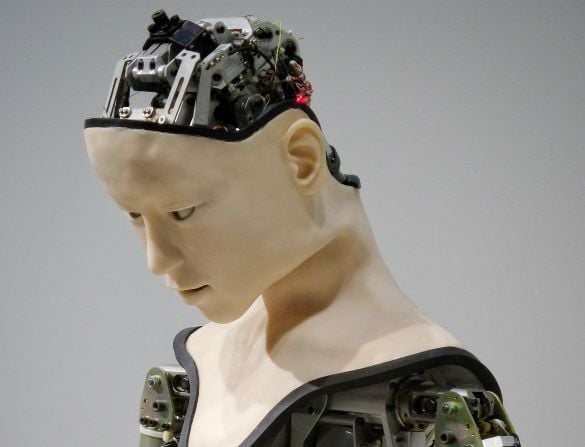AI (Artificial Intelligence) can now generate a sermon that mimics the writing of a human preacher. How will we know who is truly writing the pastor’s sermon?

A paradigm shift for preachers
The first time a preaching colleague showed me AI (Artificial Intelligence) generating a sermon on her phone, I was sitting next to her on a bus in early December 2022 as we were riding back to our hotel at the annual meeting of the Academy of Homiletics. (AOH is the professional guild of those who teach preaching.) In seconds, the program had produced a sermon – something that takes a preacher hours and days to produce. Suddenly, it felt like the bus had taken a sharp turn and was about to tip over.
But no, that was just my world veering and teetering into a paradigm shift.
My colleague’s name is Rev. Lisa Cressman, Founding Steward of Backstory Preaching, an online preaching community made up of nearly 2,000 ordained and lay preachers. And the app she showed me is called Craft, a writing program that uses Artificial Intelligence to create content that mimics human writing. (See the end of this article for other AI apps.)
What is AI-generated content?
Let’s let Craft tell us about AI. Here’s what I got when I asked it to write an article about AI-generated content:
AI-generated content is created by machines that utilize artificial intelligence. It is content created by algorithms which are programmed to produce output that is similar to content created by humans. AI-generated content is becoming increasingly popular as it can take a huge amount of effort and time away from the content creator and provide better and faster results.
What can a program like Craft do?
In that short bus ride, Lisa showed me how she can input the text from a book and ask Craft to summarize it, create an outline, offer pros and cons, and even continue writing the next paragraph based on what has already been entered into the program. This was stunning enough. But what she showed me next sent a crack down through the foundation of my preaching world.
AI, write me a sermon
Lisa entered in a biblical passage and entered the command “write a sermon.” It churned out 300-word mini-sermon in seconds. We read it together. It wasn’t the best sermon we’d ever read. But it wasn’t the worst. And as teachers of preaching, I can tell you, we’ve seen our share of bad sermons.
Then she hit the refresh button, and it generated a whole new sermon. I couldn’t believe that a computer was outputting something that takes me hours of exegesis, prayer, contemplation, and writing rough drafts to get something I consider decent enough to preach.
Even though I was sitting down, I felt a wave of dizziness on this bus ride into a future that was coming way too fast for me to process.
A Pandora’s Box of AI ethical conundrums
Gasping in what suddenly felt like very thin air, I asked, “What’s to stop a preacher from letting AI write their sermons for them? What’s to stop students from having AI write the book review I assign in class? And aside from my own moral and ethical fortitude, why wouldn’t I use AI to create content for a blog post, a chapter in a book, or a lecture for a class?”
“I know!” Lisa whispered. “Just think of the possibilities! And the very real ethical issues this raises!” We hovered over the glowing screen as if we had just discovered Pandora’s Box right in the palm of her hand.

AI can’t always be detected . . .
At first, it may seem difficult to detect whether or not a preacher used AI. For example, consider this first paragraph from a “sermon” that I asked Craft to write about Genesis 1:1:
Take a moment and read this powerful scripture: “In the beginning God created the heavens and the earth.” God is the creator of all. He is the mastermind behind everything in our world. He is the architect of the universe, the creator of every living thing, and the author of the divine plan. This powerful God is the one who made man in His image. He gave us life and the power to be creative and to build. He endowed us with the unique ability and potential to be more than just He created us to be. It is God’s intention that we live lives of purpose and meaning. He created us with special talents and abilities so that we can use them to bless others and bring glory to His name.
For some, this would be perfectly acceptable. There are several clear theological claims about who God is and what God does. And the sermon tells us what Genesis 1:1 has to do with us as human beings (It is God’s intention that we live lives of purpose and meaning. He created us with special talents and abilities so that we can use them to bless others and bring glory to His name.)
. . . but there are clues…
However, my students know that I would never accept a sermon that refers to God and humanity exclusively using male pronouns. There is also some awkward grammar in this sentence: He endowed us with the unique ability and potential to be more than just He created us to be. Certainly, some humans do write like this (which is why AI is mimicking this syntax). But as a professor of homiletics, this would tip me off that perhaps my student didn’t actually write these words.
The next paragraph sounds like it came straight out of a Prosperity Gospel pulpit.
Today I want to challenge you to recognize God’s sovereignty and to submit to His will and His plan in your life. You see, when we live according to His plan, we find true joy and satisfaction. When we live according to His design, there is nothing that can stand in our way.
Really? This pull-yourself-up-your-bootstraps theology is incredibly problematic. And it’s just plain wrong. Lots of things can stand in our way of finding “true joy and satisfaction” even when we “live according to His design.” Not to mention the fact that there is absolutely no evidence of any kind of exegesis about the biblical text. It’s just platitudes and aphorisms without any real substance.
The end of this mini-sermon is chock-full of “lettuce.”
Let us put our faith in Him and trust that He will direct our paths. Today, let us remember His words from the beginning of Genesis. He is the one who created the heavens and the earth, who gave us life and gave us purpose. Let us trust in His plan for our lives and live according to His will.
Three times this AI-preacher uses the words “let us.” This lofty-sounding phrase is meant to convey an exalted-yet-benevolent tone imploring the congregation to respond in some way. But this jussive command is so overused in sermons, it has about as much impact as a head of iceberg lettuce. The fact that the AI used it so many times indicates how often it is spoken by the preachers whose sermons the technology mined for this sermon!
So, if a student turned in a sermon like this, I would ask whether or not they had used AI to help generate their content. But a congregation might not recognize these clues and simply trust that their pastor had written this sermon all on their own.
Is it plagiarism to use AI?
This is a tricky question. Because AI draws from vast databases of existing text on the Internet, we can’t trace its content to any single source. The technology, in a sense, crowdsources from the cumulative writings of human beings over time and attempts to use natural language processing to create its “original” content.
But it certainly feels like cheating to me.
In fact, it’s cheating on two levels. AI is taking content without giving credit for it because it’s generated on algorithms. (Note that some apps do name the sources from which they draw.) And if a preacher uses this content in a sermon without acknowledging that they did so, the case could be made that they are lying to the congregation about the authenticity of their sermon.
Where do we go from here?
Since Lisa and I had this conversation in December 2022, AI has taken the world of education by storm. I’m seeing articles everywhere debating the pros and cons of using AI in writing and education. (See examples at the end of this piece.)

At Lexington Theological Seminary where I teach, I know this topic will generate much discussion about the ramifications for theological education. We’ll need to be thinking about how we handle this new technology with our students and faculty.
And I’m certain that our conversations at next year’s Academy of Homiletics meeting will be shaped by the influence of AI on sermons and preaching over this next year. At the very least, those of us in theological education may have to teach a new skill set – how to use AI ethically. This means we’ll have to experiment with this technology and learn how to use it ourselves.
Lisa and her colleague Shaundra Taylor have already written a thought-provoking piece about navigating the “moral maze” of using AI for sermons in which they share recommendations and next steps. You can read their helpful article here.
Standing at the Tree of Knowledge of Good and Evil
As a preacher and seminary professor, I feel like I’m standing at the proverbial Tree of Knowledge of Good and Evil (Genesis Chapter 3) with gnawed cores of fruit scattered on the ground. There’s no going back now. We have to figure out how we go forward.
Apparently, Craft’s AI agrees. When I asked it to write a sermon on Artificial Intelligence, here’s what it “preached”:
The possibilities are endless, but as with anything else, we must keep a level head and ensure that we don’t lose sight of our ethical standards and values. We must ensure that the safety, privacy, and rights of humans are respected and upheld. So, as we continue our journey into the world of AI, let us approach it with a balanced mind and an open heart. Let us strive for a world where humanity and machines exist in harmony, as equal partners and co-creators on the path to a better future. Thank you, and may God bless us all.
And like a serpent coiling around the tree, AI beckons . . .

Update, 2/2/23
I learned that Edward Tian, a 22-year-old senior at Princeton University, has built an app to detect whether text is written by AI. You can read the NPR article about his work here. You can try out the app, GPTZero here. In my initial tests with the app, it was accurate in detecting text written by a human and text written by AI.
Links to articles about AI and writing or education:
“A tech news site issued a string of corrections after an article quietly written by AI got key facts wrong.” By Samantha Delouya, Business Insider, Jan. 17, 2023.
“The End of the High School Essay.” By Seth Godin, Seth’s Blog, January 10, 2023.
“AI Can Now Write Like a Human. Some Teachers Are Worried.” By Mike Bebernes, YahooNews, Dec. 21, 2022.
And here’s a Twitter thread from a professor who caught a student using AI to write their work: https://twitter.com/Scenario_2020/status/1608359406730907649
Other AI platforms and apps:
Read also:
Announcing Preaching Survey: Ministry, Preaching, and Social Issues
What is ‘Good Preaching’? A Sermon about Sermons

The Rev. Dr. Leah D. Schade is the Associate Professor of Preaching and Worship at Lexington Theological Seminary in Kentucky and ordained in the ELCA. Dr. Schade does not speak for LTS or the ELCA; her opinions are her own. She is the author of Preaching in the Purple Zone: Ministry in the Red-Blue Divide (Rowman & Littlefield, 2019) and Creation-Crisis Preaching: Ecology, Theology, and the Pulpit (Chalice Press, 2015). She is the co-editor of Rooted and Rising: Voices of Courage in a Time of Climate Crisis (Rowman & Littlefield, 2019). Her newest book is Introduction to Preaching: Scripture, Theology, and Sermon Preparation, co-authored with Jerry L. Sumney and Emily Askew (Rowman & Littlefield, 2023).

















